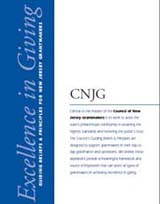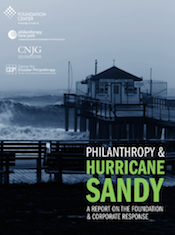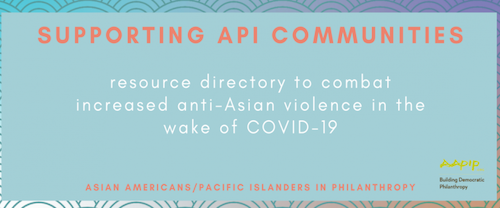Site Search
- resource provided by the Forum Network Knowledgebase.
Search Tip: Search with " " to find exact matches.
In response to the murders of George Floyd, Breonna Taylor, Tony McDade, Ahmaud Arbery, and countless other Black individuals, we have seen a call to end systemic racism, police brutality, and injustice. To explore philanthropy's role in fighting against racism and injustice, CNJG is sharing information about upcoming programs that we and our Philanthropy-Serving Organizations are presenting and other resources below. While some programs or resources have been organized in direct response to recent protests and calls for action, all are part of a longer conversation on racism in our country and within our sector. As CNJG weaves equity into all of our work, we look forward to continuing these conversations with you.
We realize this is not a comprehensive list, and we are posting items that CNJG staff sees, which is not nearly enough. We ask that our members, especially those who are black and brown, to help us find articles written by, resources created by, and programs led by people of color. Share those resources by emailing us. This page is just a part of our work in equity. We created this page as one starting point for New Jersey’s philanthropic community to engage in conversations, do background reading, attend programs, learn, and take action.
For those members interested in continuing the conversations, we invite you to join our Racial Equity listserve, by emailing Craig Weinrich. On that listserve, members can share information, resources, and opportunities that are helpful to the funding community.
Visit these Websites
Asian Americans/Pacific Islanders in Philanthropy (AAPIP) Resource Directory
This Supporting API Communities Resource Directory was developed to mobilize the philanthropic sector towards meaningful action in the midst of heightened violence and hate targeting Asian American communities.
Participatory Grantmaking
A curated list of resources and articles from Candid on the movement of participatory grantmaking that engages the community in the grantmaking process.
The Power of Asset Framing: A Conversation with Trabian Shorters
This blog post by the Skillman Foundation contains a series of short videos by Trabian Shorters, founder and CEO of BMe Community, who describes shifts in narrative that all philanthropy should consider.
Putting Racism on the Table
This site created by the Washington Regional Association of Grantmakers is the inspiration for CNJG’s Race, Racism and the Ramifications for Philanthropy Series.
Race to Lead Series
A site with reports and surveys on the racial leadership gap in the nonprofit sector.
Stanford Social Innovation Review
The Struggle to Overcome Racism, a list of resources to help leaders of social change and activists.
Trust-Based Philanthropy Project
A peer-to-peer learning and advocacy initiative to make philanthropy more based on trust.
I hope you had a chance to pause and find moments of celebration and peace over the Fourth of July holiday with family and friends.
July 4 was also the day that President Trump signed the One Big Beautiful Bill, a massive tax and spending package. The legislation includes a permanent universal charitable deduction ($1,000/$2,000) empowering all Americans to give, and removal of the foundation excise tax increase, protecting billions of dollars in investments for communities. Among its many devasting provisions, it cuts “$1 trillion from the federal Medicaid program, with over 360,000 in New Jersey potentially losing coverage. Almost $300 billion in cuts are also planned for the Supplemental Nutrition Assistance Program (SNAP), impacting some 800,000 state residents enrolled in that program,” (New Jersey Spotlight). Ultimately these cuts will impact state budgets, including in our own state.
United Philanthropy Forum makes clear in their statement following the Senate passage, that cuts to Medicaid, SNAP, and other vital safety net programs will significantly harm communities and people that the social sector – philanthropy and nonprofits – work to empower and elevate. The letter goes on to state:
The irony is cruel: Congress has expanded incentives for charitable giving while simultaneously creating conditions that will dramatically increase the need for charitable services. Philanthropy cannot fill the massive gaps these cuts will create.
In the face of such challenges, the need for robust civic engagement has never been more urgent. Civic engagement is the bedrock of a healthy democracy – it's the process of empowering individuals to be active participants in building and strengthening our communities and ensuring all voices are heard. It encompasses everything from direct interactions with government to the vital work of voluntary associations. It is precisely in times like these that our collective participation, our shared insights, and our collaborative action become most critical.
It was with this understanding that we convened the CNJG 2025 Conference for the Social Sector — Stronger Together: Philanthropy & Civic Engagement on Wednesday, June 18th. The conference brought together more than 350 funders, nonprofit leaders, and changemakers for a discussion on how philanthropy and nonprofits can work together to address and increase civic engagement. We explored key areas like local news, participatory budgeting, guaranteed income, and public-private partnerships just to mention a few. The energy in the room was palpable, reflecting a shared commitment to finding solutions and building a more equitable
New Jersey.
Many attendees participated in the New Jersey Council for the Humanities’ Democracy Conversation Program, during the opening session and throughout the day, sharing their perspectives on democracy. To see what your colleagues were saying, click here and then scroll down to filters at the top of chart, and select the "CNJG" tag. Thank you to NJCH for capturing the social sector’s voices from our conference as part of this project.
To keep the momentum going and deepen our understanding and collective impact, we invite you to register for these upcoming programs:
Funder Briefing: New Jersey State Budget - FY 2026, Federal Threats & What Comes Next - Wednesday, July 16, 2025, | 1:00 PM - 2:00 PM - This timely funder briefing will break down the state budget and the implications of federal policies on New Jersey's communities and the social sector.
2025 Summer Joint Policy Forum: Nonprofit and Philanthropic Champions for New Jersey - a partnership program of CNJG and the New Jersey Center for Nonprofits - Tuesday, August 5, 2025, | 8:00 AM - 2:30 PM | The Heldrich Hotel & Conference Center, New Brunswick, NJ - Join us for a powerful day of advocacy and collaboration, shaping the policy landscape for a stronger New Jersey.
Staying informed and working collaboratively is one way we can navigate these challenging times and continue to build a more just and thriving New Jersey.
Warmly,
Theresa Jacks, President and CEO
Council of New Jersey Grantmakers
This weekly conference call series welcomed New Jersey-based grantmakers along with national funders and provided an opportunity for grantmakers to hear from a wide range of experts in the field of disaster philanthropy. This series started on November 5, 2012, one week after Sandy struck New Jersey, and continued through March 25, 2013. The written summaries of each recording are listed below.
President Obama's Hurricane Sandy Task Force released this rebuilding strategy to serve as a model for communities across the nation facing greater risks from extreme weather and to continue helping the Sandy-affected region rebuild. The Rebuilding Strategy contains 69 policy recommendations, many of which have already been adopted, that will help homeowners stay in and repair their homes, strengthen small businesses and revitalize local economies and ensure entire communities are better able to withstand and recover from future storms.

This includes insights and tips related to board governance, legal compliance, grantee communications, fiscal responsibility, public disclosure, and many other key areas of foundation governance and operations. It is intended to serve as a practical resource to assist foundations in their grantmaking.
This report highlights three philanthropic efforts to build the capacity of local communities in the West - The Ford Family Foundation’s Ford Institute Leadership Program, the Northwest Area Foundation’s Horizons Program, and the Orton Family Foundation’s Heart and Soul Community Planning Program.
This weekly conference call series welcomed New Jersey-based grantmakers along with national funders and provided an opportunity for grantmakers to hear from a wide range of experts in the field of disaster philanthropy. Series 1 started on November 5, 2012, one week after Sandy struck New Jersey, and continued through March 25, 2013. Series 2 started on September 9, 2013 and concluded on November 4, 2013. The written compendium of the recordings is listed below.

This new report from CNJG and partners examines the response of foundations, corporations, and other institutional donors to the devastation wrought by Hurricane Sandy in October 2012. Numbering nearly 600, these funders have so far committed more than $380 million for relief, recovery and building efforts. The hard data and reflective observations in the report contribute to the growing body of knowledge that helps foundations and corporations be strategic and effective with their giving when disaster strikes.
Two years after the historic storm, Philanthropy & Hurricane Sandy: A Report on the Foundation & Corporate Response breaks down the allocation of dollars contributed thus far and offers perspective on the role of private giving in disaster response and lessons to be taken from this one. The report was published by the Foundation Center in partnership with the Council of New Jersey Grantmakers and Philanthropy New York, and with support from the Center for Disaster Philanthropy.
“Throughout the past two years, our exceptional nonprofit and funder community has taken on challenges they never imagined,” said Nina Stack, president of the Council of New Jersey Grantmakers. “These organizations continue to develop innovative solutions that other communities will learn from and build upon in future disasters.”
In addition to the report’s numerous funders, CNJG wishes to thank the PSEG Foundation for supporting this project.
This tool for unstaffed foundations includes an accountability self-assessment and a legal checklist. It is divided into nine topic sections, each of which is divided into three levels, which can help foundations tailor the tool to meet their specific interests and needs. Also included are an Excel spreadsheet to help tabulate responses, an extensive accountability resource list, and a glossary of key words and concepts used in the tool.
Alexis Bivens, Vice President of Strategic Initiatives and Managing Director of the Supporting Organizing Work Funders Collaborative, Connecticut Council on Philanthropy, presents the process and progress of how an affinity group transformed into a funders collaborative, how it was resourced, and challenges along the way.
This resource guide includes various virtual volunteer opportunities, additional resources, and best practices for corporate volunteer programs during the coronavirus pandemic.
This resource will be updated, as CNJG and corporate members collect new information and opportunities to share with colleagues.
Capacity building enables nonprofit leaders and organizations to develop the skills and resources they need to improve their work. Since each situation is unique and circumstances are always changing, effective capacity-building support is tailored to best suit the needs of grantees. This publication offers practical guidance and considerations to help grantmakers design an impactful approach.
The Ford Institute for Community Building, a program of The Ford Family Foundation, works to help community leaders learn how to implement local solutions based on principles of effective community building. This paper describes the development and work of the The Ford Institute for Community Building.
Strategic asset allocation is arguably one of the most important, yet least advanced, aspects of investing. The Investment Strategy Group (ISG) in the Goldman Sachs Investment Management Division has developed a new approach to strategic asset allocation, which leverages the idea that long-term investment returns derive from multiple distinct sources called “return-generating factors.” This multi-factor approach is designed to help investors better understand the key sources of long-term return across asset classes and to increase the precision of long-term risk and return estimates. It also provides investors with a new way to think about portfolio diversification, allowing them to focus not only on diversification across asset classes but also
on diversification across the underlying sources of return.
This weekly conference call series welcomed New Jersey-based grantmakers along with national funders and provided an opportunity for grantmakers to hear from a wide range of experts in the field of disaster philanthropy. This series started on September 9, 2013 and concluded on November 4, 2013. The written summaries of each recording are listed below.

